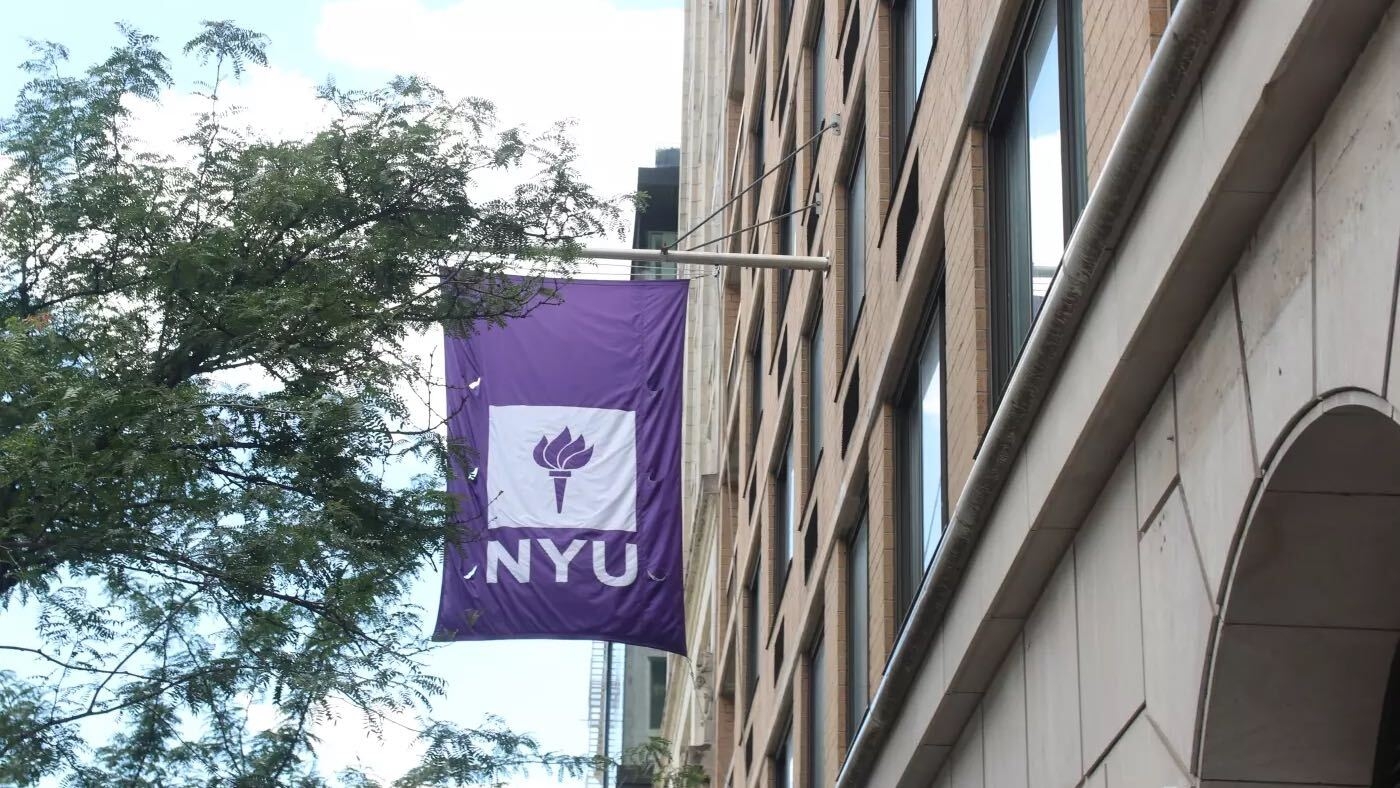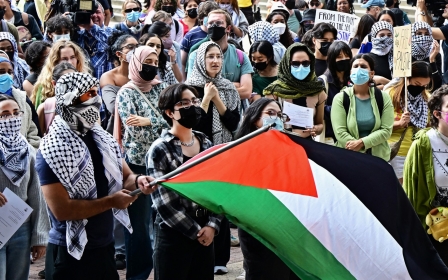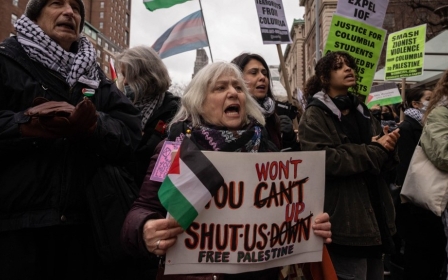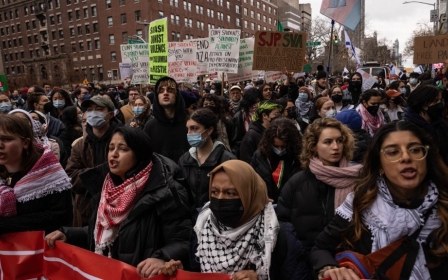Hundreds of New York University alumni refuse to donate to university over Palestine policy

Hundreds of alumni from the prestigious New York University (NYU) in New York City will withhold more than $3m worth of potential contributions from the institution's largest fundraising day on Wednesday over its suppression of students and faculty organising against what they call "genocide" in Gaza.
NYU Alumni for Palestine, the group that mobilised to deter alumni from donating to the university, told Middle East Eye that the stifling of pro-Palestinian voices and its refusal to condemn Israel's killing of Palestinians in Gaza had compelled them to take action against their alma mater.
The number of Palestinians killed is now upwards of 32,000 people since 7 October when the war broke out.
The group cited an informal tracker created by NYU Faculty for Justice in Palestine, which documented retaliatory actions against an estimated 100 students as well as 25 staff and faculty over the past six months because of their comments or mobilising for Palestine.
These retaliations, the spokesperson for the group said, included protracted investigations, verbal and written warnings, threats to scholarships and financial awards, withdrawals of scholarships and financial awards, suspensions, expulsions, as well as termination of employment.
"We launched this campaign as a signal to the administration to drop its repression on campus," a spokesperson for NYU Alumni for Palestine, told MEE.
"We will hold [NYU President Linda Mills] accountable through public, financial, and other pressures until we see that all suppressions are dropped and all individuals who have been terminated or expelled are reinstated," the spokesperson said.
New York University did not reply to Middle East Eyes's request for comment by the time of publication.
According to an online petition signed by 342 people - 92 percent of whom are alumni - the university stands to lose upwards of $3.4m in contributions as a result of its sustained administration-led effort to stifle students and faculty from speaking on and organising for Palestinian human rights.
"We will ramp up pressure on the administration in every peaceful route we can - through PR, financial pressure and boycott, and other means - until the administration meets the demands outlined in our letter and ends its complicity in the Israeli genocide in Gaza and the Israeli occupation of Palestine," the spokesperson added.
'One-Day' campaign
NYU's One Day campaign is considered one of the biggest fundraising events for NYU. According to the NYU website promoting the event, the One Day campaign is a "24-hour day of giving".
"Show your support for academic excellence and help our students who dream of leading, creating, healing, serving and collaborating," the site reads.
But organisers say the university is being disingenuous when linking fundraising efforts with helping underprivileged and marginalised communities.
"They are saying that they're fundraising to particularly support marginalised students and yet these are precisely the kinds of students they have been suppressing at the university," Maya Sikand, who graduated from NYU with a law degree in 2019, said.
Sikand told MEE she was horrified by the administration's response to student and faculty efforts to organise for Palestine on campus.
She said that she couldn't in good conscience donate to the university given how the institution has mistreated faculty and confronted students who were calling for a ceasefire and an end to genocide in Gaza.
In January, two professors were suspended for their public comments on the Israeli assault on Gaza. First, Amin Husain, an adjunct professor at NYU, was suspended for criticising media coverage of Hamas.
Husain was followed by the suspension of Steinhardt professor Tomasz Skiba over a series of social media posts, one in which he was seen refusing to condemn Hamas.
In another incident in January, administrators shut down a pro-Palestinian poetry reading in the lobby of the Elmer Holmes Bobst Library at NYU.
Earlier, in December, a first-year student was suspended for pulling down posters of Israeli hostages that had been put up at the university.
Lyra Monteiro, another graduate from NYU, described the series of incidents at the university as "embarrassing".
As someone who has been following the events at NYU over the past five months, Monteiro said the moment she saw that alumni were organising to withhold donations from the university over what is often described as the Palestine exception to free speech, she immediately got on board.
"It's always been clear to me that alumni have a unique power to influence what a university does," Monteiro, who has donated to NYU in the past, told MEE.
According to the NYU Alumni for Palestine, 30 percent of signatories to the petition are donors who have contributed to the university previously.
Stifling activism
For decades, American universities have been at the frontline of efforts to censor and stifle activism over Palestine.
Universities have also been incubators for smear tactics and intimidation targeting Palestinian voices in particular, as directed by pro-Israel lobbying groups.
Several American universities have maintained deep ties with Israeli institutions of higher learning and continue to hold investments in weapons companies servicing Israel.
In the case of NYU, the institution has a study abroad programme in Tel Aviv.
In 2020, NYU adopted the International Holocaust Remembrance Alliance (IHRA) definition of antisemitism, which human rights experts say conflates criticism of Israel with antisemitism.
Since 7 October, students from several prestigious institutions of higher learning have faced off with university administrators who enjoy the backing of pro-Israel donors.
Students and faculty raising the banner of Palestine or calling for a ceasefire have been repeatedly slandered with accusations of antisemitism.
Andrew Ross, a professor at NYU and a member of the NYU Faculty for Justice in Palestine, described the institution as having undermined the most basic of principles of academic freedom, in response to "the most spurious of allegations in order to crack down illegitimately on speech and action often from students who are working with organised outside groups to trigger those investigations".
"This is happening all across the country. We have our own version at NYU. Every campus is different, but there are common patterns across the country," Ross said, adding that he welcomed the initiative from alumni.
"I think at NYU it's an embryonic initiative. But it deserves a lot of attention," Ross added.
Organisers of NYU for Palestine say the boycott of the fundraising event comes after more than 2,300 alumni signed an open letter in December, calling on NYU to change track on Palestine, including ending its "complicity" in the "genocide" unfolding in Gaza.
"She [NYU President Mills] responded with an extremely dismissive letter and refused to even give us a meeting. Therefore, we launched the Boycott One Day campaign as a signal to the NYU administration that we will not be silent," the spokesperson of the cohort added.
Middle East Eye propose une couverture et une analyse indépendantes et incomparables du Moyen-Orient, de l’Afrique du Nord et d’autres régions du monde. Pour en savoir plus sur la reprise de ce contenu et les frais qui s’appliquent, veuillez remplir ce formulaire [en anglais]. Pour en savoir plus sur MEE, cliquez ici [en anglais].




